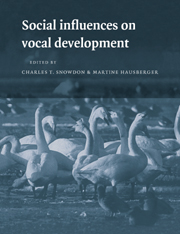Book contents
- Frontmatter
- Contents
- List of contributor
- 1 Introduction
- 2 Social interaction and sensitive phases for song learning: A critical review
- 3 Social interaction and vocal development in birds
- 4 Building a social agenda for the study of bird song
- 5 Field observations, experimental design, and the time and place of learning bird songs
- 6 Vocal learning in wild and domesticated zebra finches: Signature cues for kin recognition or epiphenomena?
- 7 What birds with complex social relationships can tell us about vocal learning: Vocal sharing in avian groups
- 8 Social influences on song acquisition and sharing in the European starling (Sturnus vulgaris)
- 9 Social influences on the acquisition of human-based codes in parrots and nonhuman primates
- 10 Vocal learning in captive bottlenose dolphins: A comparison with humans and nonhuman animals
- 11 Vocal learning in cetaceans
- 12 Social influences on vocal development in New World primates
- 13 Some general features of vocal development in nonhuman primates
- 14 Social influences on vocal learning in human and nonhuman primates
- 15 The resilience of language in humans
- 16 Reciprocal interactions and the development of communication and language between parents and children
- 17 Crafting activities: Building social organization through language in girls' and boys' groups
- Index
6 - Vocal learning in wild and domesticated zebra finches: Signature cues for kin recognition or epiphenomena?
Published online by Cambridge University Press: 04 August 2010
- Frontmatter
- Contents
- List of contributor
- 1 Introduction
- 2 Social interaction and sensitive phases for song learning: A critical review
- 3 Social interaction and vocal development in birds
- 4 Building a social agenda for the study of bird song
- 5 Field observations, experimental design, and the time and place of learning bird songs
- 6 Vocal learning in wild and domesticated zebra finches: Signature cues for kin recognition or epiphenomena?
- 7 What birds with complex social relationships can tell us about vocal learning: Vocal sharing in avian groups
- 8 Social influences on song acquisition and sharing in the European starling (Sturnus vulgaris)
- 9 Social influences on the acquisition of human-based codes in parrots and nonhuman primates
- 10 Vocal learning in captive bottlenose dolphins: A comparison with humans and nonhuman animals
- 11 Vocal learning in cetaceans
- 12 Social influences on vocal development in New World primates
- 13 Some general features of vocal development in nonhuman primates
- 14 Social influences on vocal learning in human and nonhuman primates
- 15 The resilience of language in humans
- 16 Reciprocal interactions and the development of communication and language between parents and children
- 17 Crafting activities: Building social organization through language in girls' and boys' groups
- Index
Summary
INTRODUCTION
In the mid-1960s Klaus Immelmann began a series of experiments with domesticated zebra finches (Taeniopygia guttata) that led to seminal contributions to two related fields, song learning and sexual imprinting. Immelmann (1969) manipulated the auditory and social experiences of young males in their first 100 days of life and found that those denied any contact with singing males failed to sing the normal zebra finch song at adulthood. He concluded that song in this species, like that of most songbirds, must be learned. When he isolated young from foster parents (Bengalese finches (Lonchura striata var. domesticaj) at different ages he found that the sensitive phase for song acquisition began as early as 25 days of age, about a week after fledging, and ended around 80 days of age, around the onset of sexual maturity. Furthermore, young males did not learn from just any singing adult, but preferred to copy from the male with whom they formed a personal bond. In most instances this was the father or foster father and the bond was based primarily on the provisioning relationship, the most basic filial bond. Immelmann (1969) hypothesized that wild zebra finches would be likely to learn the songs of their fathers, and an early end to the sensitive phase was necessary in order to prevent learning from heterospecific estrildines.
The experimental possibilities raised by Immelmann's intriguing study of song eventually stimulated a steady series of follow-up experiments by other researchers, in particular, by P. J. B. Slater and coworkers, who used song learning in domesticated zebra finches as a model for teasing apart the subtle interactions involved in the development of behaviour (for a review, see Slater et al. 1988).
- Type
- Chapter
- Information
- Social Influences on Vocal Development , pp. 85 - 97Publisher: Cambridge University PressPrint publication year: 1997
- 14
- Cited by



